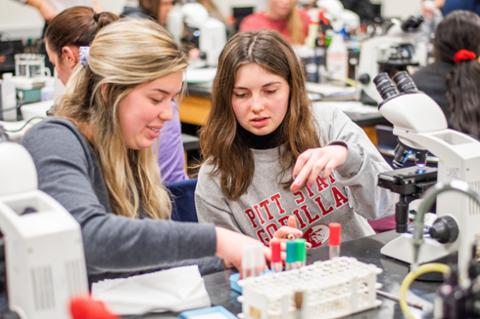General Science Minor

Gain hands-on laboratory experiences and exploration of scientific principles across multiple disciplines.
The General Science Minor equips students with critical thinking skills and scientific knowledge essential for addressing complex scientific challenges and making informed decisions in a variety of contexts.
Through coursework in topics like biology, chemistry, physics, and earth sciences, students gain a comprehensive understanding of the natural world and its interconnected phenomena.
Unique class topics in the General Science Minor:
- General Biology: Explore fundamental principles and processes of life as found in animals and plants and their relation to the everyday life of man, through interactive lectures and discussions.
- General Biology Laboratory: Apply theoretical knowledge in practical settings, conducting experiments and investigations to reinforce understanding of biological principles and develop laboratory skills.
- General Chemistry I: Dive into the study of chemical principles, atomic structure, and chemical bonding, engaging in theoretical and mathematical analyses to comprehend fundamental concepts in chemistry.
- General Chemistry I Laboratory: Enhance understanding of chemical phenomena through hands-on experimentation, data analysis, and laboratory techniques, reinforcing concepts learned in the lecture portion of the course.
- College Physics I: Investigate the fundamental principles of physics, including mechanics, motion, and forces, through lectures, demonstrations, and problem-solving activities.
- Elementary Physics Laboratory I: Gain practical experience in physics concepts through laboratory experiments, data collection, and analysis, reinforcing understanding of physical laws and principles.
- Physical Geology: Explore the dynamic processes shaping the Earth's surface and interior, examining plate tectonics, volcanism, orogeny, glaciation, weathering, and erosion through lectures, field trips, and hands-on activities.
- Descriptive Astronomy: Discover the wonders of the universe, exploring celestial bodies, astronomical phenomena, and cosmological theories through lectures, observations, and interactive discussions.